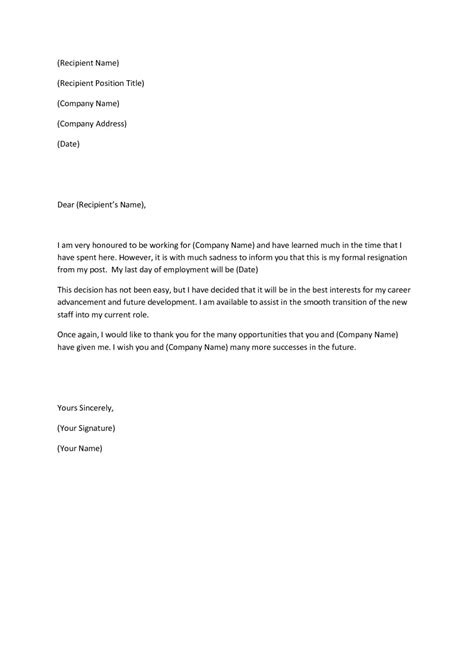Resignation: Meaning & Tips For A Smooth Transition

Resignation is the formal act of voluntarily leaving a job or position. It is a decision made by an employee to terminate their employment contract with an organization. Resignation can be prompted by various reasons such as career growth opportunities, personal circumstances, dissatisfaction with the job, or the need for a change. Whatever the reason may be, resigning from a job is a significant step that requires careful planning and execution to ensure a smooth transition for both the employee and the organization.
1. Understand the Implications
Before submitting your resignation, it is crucial to understand the implications it may have on your career and personal life. Consider the following:
- Career Impact: Reflect on how resigning from your current job will affect your career progression and future job prospects.
- Financial Considerations: Evaluate your financial situation and ensure you have a plan in place to support yourself during the transition period.
- Health Insurance and Benefits: Research and understand the impact of your resignation on your health insurance coverage and other benefits provided by your employer.
2. Plan Your Transition
Resigning from a job requires careful planning to minimize disruptions and ensure a smooth transition. Consider the following:
- Notice Period: Review your employment contract and determine the notice period you are required to provide. This will vary depending on your organization and seniority level.
- Communicate with Your Manager: Schedule a meeting with your immediate supervisor to discuss your decision to resign and the transition process. Maintain a professional and respectful approach during the conversation.
- Document Your Responsibilities: Create a comprehensive handover document outlining your current projects, tasks, and any pending work. This will help your successor to seamlessly take over your responsibilities.
3. Submitting Your Resignation
When submitting your resignation, it is important to do so in a professional and formal manner. Here’s how:
- Resignation Letter: Write a formal resignation letter addressed to your immediate supervisor or the appropriate authority within your organization. Keep the letter concise, stating your intention to resign, your last working day, and expressing gratitude for the opportunities provided.
- Deliver the Letter: Schedule a meeting with your manager to hand-deliver the resignation letter. This will allow you to have a face-to-face conversation and discuss any questions or concerns.
4. Maintain Professionalism
During your notice period, it is essential to maintain professionalism and fulfill your obligations as an employee. Consider the following:
- Work Ethic: Continue to perform your duties to the best of your ability and maintain high standards of work ethic.
- Collaboration: Collaborate with your colleagues and provide support during the transition process. Offer assistance to your successor and ensure a smooth handover.
- Confidentiality: Respect the confidentiality of sensitive information and refrain from discussing organizational matters outside of the workplace.
5. Exit Interview
Many organizations conduct exit interviews to gather feedback and insights from employees who are leaving. Participating in an exit interview can be beneficial for both parties. Consider the following:
- Honest Feedback: Provide honest feedback about your experience with the organization, highlighting both positive aspects and areas for improvement.
- Constructive Suggestions: Offer constructive suggestions that can help the organization enhance its processes and work environment.
Conclusion
Resigning from a job is a significant decision that requires careful consideration and planning. By understanding the implications, planning your transition, submitting your resignation professionally, maintaining professionalism during the notice period, and participating in an exit interview, you can ensure a smooth transition for both yourself and your organization.
Frequently Asked Questions
- How much notice should I give before resigning?
- Should I explain my reasons for resigning in the resignation letter?
- What should I do if my employer offers a counteroffer?
- How should I handle questions about my resignation during job interviews?
- Is it necessary to provide a detailed handover document?
The notice period may vary depending on your employment contract and the policies of your organization. It is recommended to refer to your contract or consult with HR to determine the appropriate notice period.
While it is not mandatory, you may choose to provide a brief explanation for your resignation in the letter. However, it is important to maintain a professional tone and avoid negative or disparaging remarks.
If your employer offers a counteroffer, carefully evaluate the pros and cons before making a decision. Consider your reasons for resigning in the first place and whether the counteroffer addresses those concerns. Ultimately, make a decision that aligns with your long-term career goals and personal aspirations.
When discussing your resignation during job interviews, it is important to be honest and tactful. Focus on the positive aspects of your decision, such as seeking new challenges or career growth opportunities. Avoid speaking negatively about your previous employer or colleagues.
Providing a comprehensive handover document can greatly assist your successor and ensure a smooth transition. Include relevant information about ongoing projects, key contacts, and any pending tasks. It demonstrates your professionalism and commitment to a smooth handover process.
